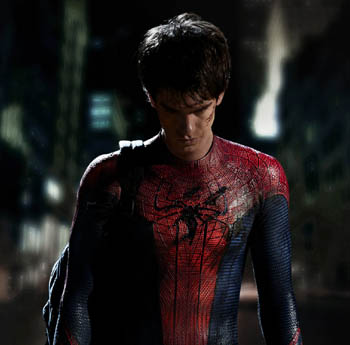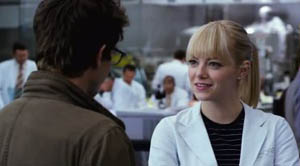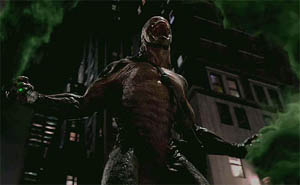|
See, the previous three Spider-Man films weren't amazing. That's why they decided to restart the whole thing just one decade later. An absence of the amazing. It all makes sense now. 
Like many, the idea of hitting the "reset to zero" button on a franchise only ten years old struck me as borderline abuse of this whole "reboot" mentality. Did we really need Spider-Man's origins explained all over again while still within the recent memory of most film-goers? The need is debatable, but this new film at least comes at the story from a different direction, and the results are illuminating: one emerges with the notion that the best possible Spider-Man film has yet to be created (my personal vote is to see Spider-Man pitted against Mysterio in a film directed by David Lynch, but I'm not holding my breath on that one). A very young Peter Parker's parents leave one night under mysterious circumstances and are never seen again, leaving the boy in the care of his aunt and uncle. When the boy grows up, his natural desire to know what became of mom and dad leads him to an old colleague, Dr. Curt Connors, and the mysterious Oscorp, where advanced research on genetics is underway and whose perpetually unseen CEO Norman Osborn is dying of an unspecified malady. In a scene certain to give terminal willies to arachnophobes everywhere, Peter is exposed to the genetically-altered spiders that will unleash his wall-crawling powers. Meanwhile, Dr. Connors pursues his studies into the potential regenerative power of lizard DNA in hopes of possibly curing the ailing Osborn, along with the hoped-for restoration of his own right arm. As one might expect, things don't go quite exactly to plan. 
Gone is the cornball enthusiasm and overall lightness of Sam Raimi's films, along with most of their supporting cast, as the film wisely shifts focus to previously less-well-covered characters from the comic mythos. The aptly-named Marc Webb has infused the new incarnation of Spidey with a darker and more serious tone-not too serious; this is Spider-Man, and not Batman, after all, and our hero is ever the wise-cracking smart-aleck he's known for being, but this film has a more grounded tone overall. Webb's skill for character interaction, previously seen in his surprisingly effective (500) Days of Summer, shines in scenes of Peter's courtship of police captain's daughter Gwen Stacy, bringing home just how meek a screen couple Parker and Mary Jane were in the previous trilogy. Emma Stone gives Gwen the same sort of sharp-edged charisma she's brought to previous roles in films like Easy A and Zombieland, though Andrew Garfield is a bit too conventionally good-looking to really be believable as a nerd; he's more like that guy who sulks in the back of the class and doesn't talk to anyone. Dennis Leary makes Captain Stacy a likeable hardass; an uncomfortable dinner date with Gwen's family leaves Peter questioning just how heroic his actions have truly been. Dr. Connors injects himself with the serum that will unleash his inner lizard not out of overconfidence or smug arrogance, but out of a sad desperation as he sees his hopes and dreams dwindling. Even Parker's high school rival Flash Thompson has layers in this version-not many, as it's a small role, but the effort is appreciated. 
It's hard to say if this Spider-Man is the better version. Certain points do stand out: the inevitable death of Uncle Ben is structured more logically and relies less on unlikely conicidence, but on the other hand, while Peter's desire for revenge is well-illustrated, his feelings of personal guilt in the matter seem largely diminished. The dialogue is better and more naturalistic, though it has nothing on the irreplaceable J. K. Simmons' J. Jonah Jameson, one of the greatest scene-stealing secondary characters in comic book movie history. Comedy isn't entirely gone-witness Peter's awkward first attempt at asking out Gwen, hilarious for its almost total lack of actually asking her out, but the film is missing the nearly perfect balance of the original's cast of principals, who effortlessly generated endless amounts of envy, longing, and shifting allegiances. One could conceivably take this and the first Raimi film and create a Venn diagram of the ideal Spider-Man feature. There are a few of the same problems here as with previous Spider-Man flicks. Like the Green Goblin before him, the Lizard cannot help but look a little bit silly. The film again feels the need to remind the audience, via flashback, of a plot point established only minutes earlier. And someday, one of these films needs a villain who is bad because of actual character and personality flaws, rather than one whose decency has been overthrown by a science experiment gone wrong in a continuing parade of Jekyll/Hyde-style antagonists. Future scriptwriters in the series might want to look to Thor's Loki for inspiration. The film has a final, sly romantic joke that left the story off with a strong, positive feeling, and which, if things progress the way they did in the comics, may end up in retrospect looking like an incredibly mean, bitterly ironic statement. It remains to be seen if they'll decide to go quite that dark. -review by Matt Murray
|
|
||||||||